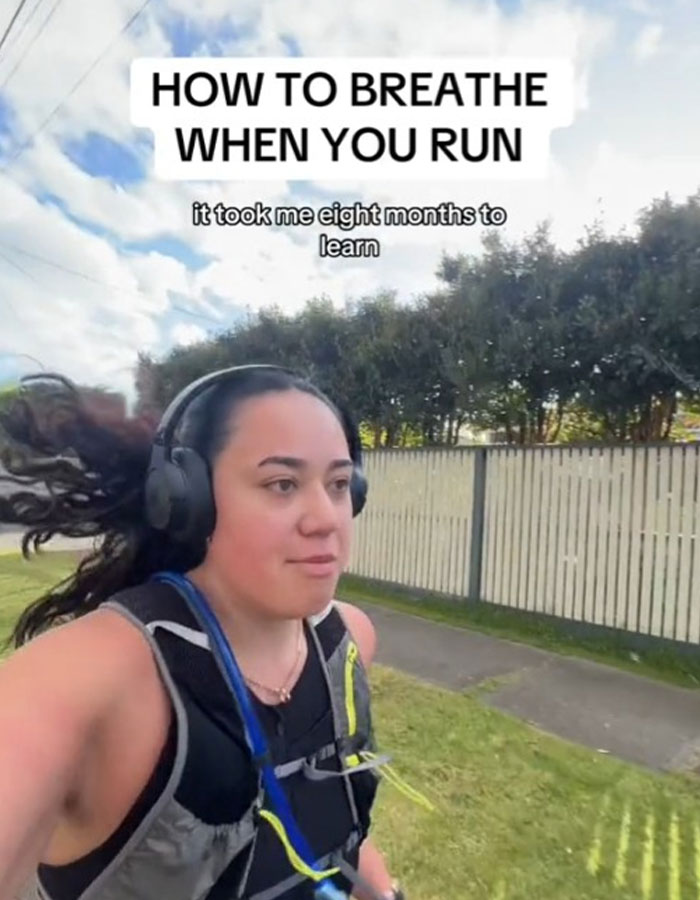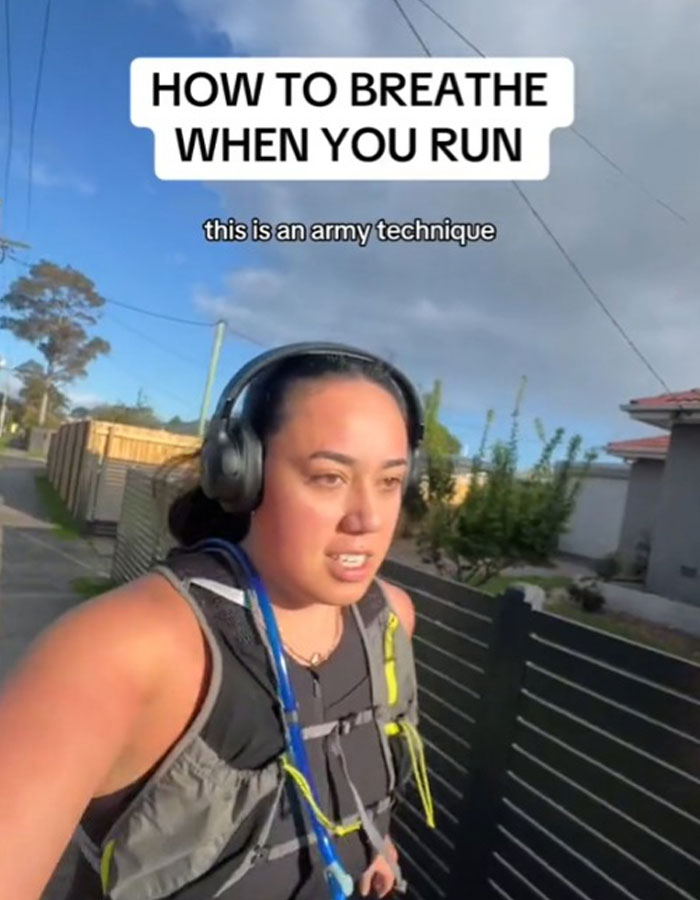Controlling your breathing while running can make workouts more efficient, as demonstrated by a woman who shared an “army breathing technique” on social media.
Maraika Rose had been running for eight months before discovering a way to make the activity less exhausting.
“Let me teach you. This is an army technique, so everything starts on your left foot,” the Polynesian runner began.
“You know how in the army they do ‘left, left, left, right, left,’ well, it’s a way of controlling their breathing.
“Every step, you’re doing something with your breathing. Essentially, what you’re doing is one deep breath in and then two half breaths out.”
Maraika Rose revealed her “army breathing technique” to make running easier in a viral video with over 3 million views

Image credits: maraika.rose
The content creator demonstrated her technique by controlling her breathing in sequences of three—in, out, out—while running on the streets of Melbourne.
“Controlling your breathing is the easiest way to keep your heart rate down. Try it,” Maraika concluded.
“No one teaches you how you’re meant to breathe when you run and it took me sooooo long to find this technique and it’s made running A LOT easier!!!” she wrote in the video’s caption.
The runner controls her breathing in sequences of three—one deep breath in and then two half breaths out

In the comments, people responded to Maraika’s fitness hack, sharing their personal experiences with this type of physical activity.
“I feel like I’m not getting enough air in when I breathe like that,” one user wrote.
“Breathing isn’t an issue for me; it’s getting up to run,” another joked.
“I used to run 7-8km [4-5 miles] a day but started with 700m on day one lol. My mate who ran with me taught me this on day two, and this breathing technique is gold,” a third shared.
“I’m gonna try this cause I sound like I’m gasping for air,” somebody else added.
“When I was super fit I used this method, went from not being able to run to running 20km [12.4 miles] no problem,” said a separate user.
Watch Maraika’s method below
@maraika.rose No bc no one teaches you how youre meant to breathe when you run and it took me sooooo long to find this technique and its made running A LOT easier!!! Credit: @Glenda #run #running #runtok #runningtips #runningvlog #polynesian #polynesiancontentcreator ♬ original sound – sped up 2000’s audios
Creating a rhythm between breathing and the way in which you run, or establishing your gait, is a successful technique for runners, the American Lung Association notes.
To practice rhythmic breathing and help oxygen better circulate throughout the body, the association recommends using belly breathing and a 5-step pattern: three steps as you inhale and two steps as you exhale (as you step: inhale left, right, left; exhale right, left, right; inhale left, right, left; exhale right, left, right).
As you run faster, you can shift to a 3-step pattern: two steps as you inhale and one step as you exhale.
Maraika had been running for eight months before discovering a technique that makes her workouts less exhausting and helps her avoid losing her breath


For optimal cardiovascular health, the Centers for Disease Control (CDC) recommends 150 minutes of moderate-intensity activity or 75 minutes of vigorous activity per week (or a combination of the two).
Instead of aiming for an intense run on a steep incline, it’s best to begin with a casual, comfortable jog and set realistic goals.
Take as many breaks as you need and control your breathing before increasing your pace.
The Centers for Disease Control (CDC) recommends 150 minutes of moderate-intensity activity or 75 minutes of vigorous activity per week


Regular aerobic exercise like jogging can help you lose weight, strengthen your body’s response to illness (both in the short and long term), protect the brain from decline related to aging and stress, improve mental health by reducing levels of the stress hormone cortisol, and maintain spinal flexibility as you age.
“Before beginning any exercise routine such as running, it is important to speak with your healthcare provider. This particularly applies to individuals who may have a chronic condition such as asthma or COPD,” advises Dr. Albert Rizzo, Chief Medical Officer of the American Lung Association.
“Learning such a technique must be a game-changer for runners,” a Facebook user wrote
















